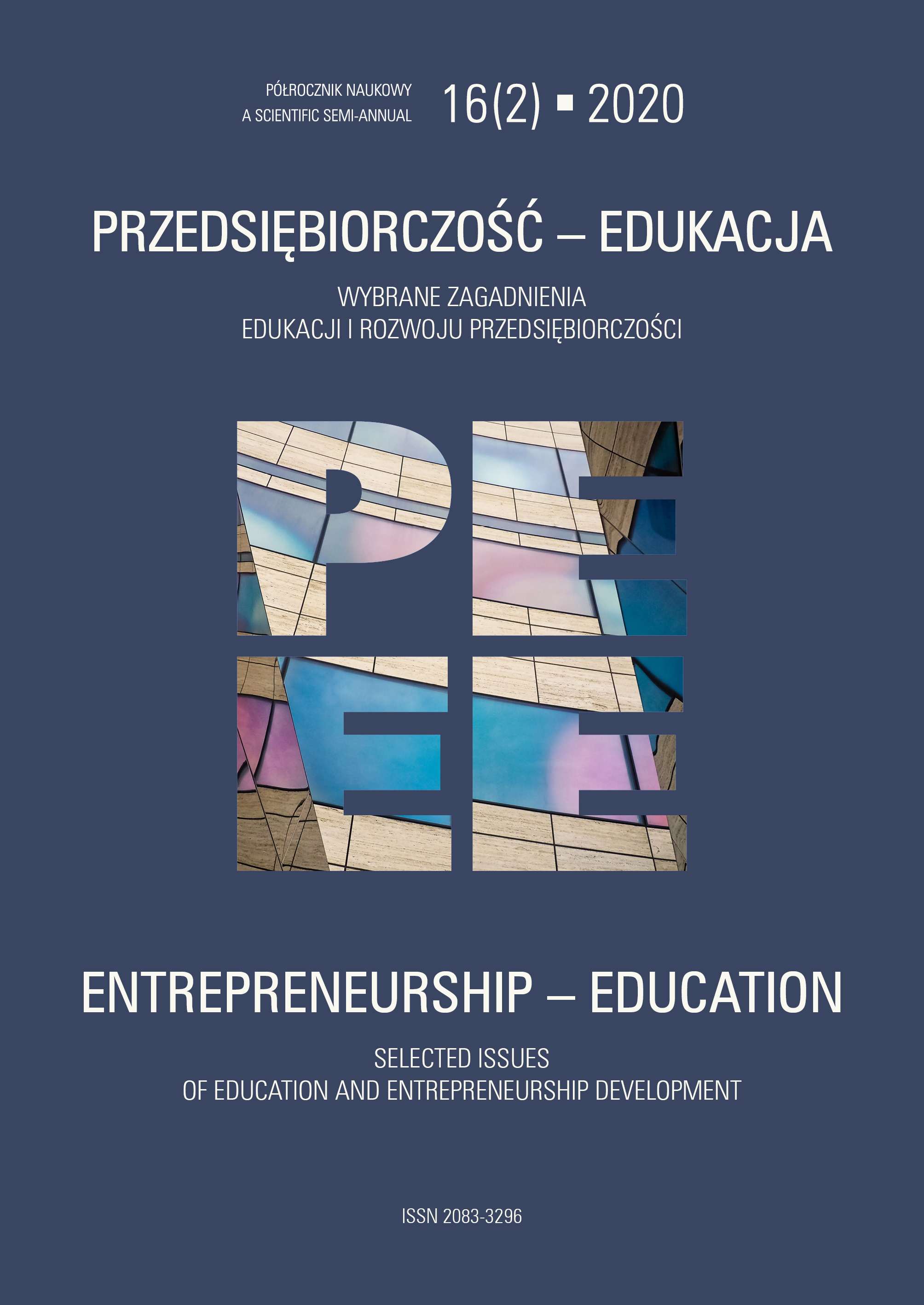Logistics Education as an Imperative for the Creationof Modern Management Methods in Industry 4.0
DOI:
https://doi.org/10.24917/20833296.162.16Keywords:
Industry 4.0, logistics education, new technologiesAbstract
Globalisation, digitisation, technologisation and Internetisation as Industry 4.0 identifiers have left their mark on many industries, including the logistics industry. Today, in order to operate effectively, one needs to have knowledge and skills related to information management. Entrepreneurs are looking for employees with preparation for work in the world of economy 4.0. The aim of the article is to show the importance of formal logistics education in the preparation of future staff in the face of the challenges of Industry 4.0 based on a selected example. The information is based on secondary and primary sources. The article uses case study analysis in relation to the implementation of logistics education based on the example of the Social Academy of Sciences. The article discusses the importance of the effective preparation of logistic staff based on formal education at universities, supported by cooperation with entrepreneurs on the formulation of the program, the implementation of specialised training and the participation of entrepreneurs in the implementation of the didactic process.
References
Bowersox, D., Closs, D., Cooper, M.B. (2012). Supply chain Logistics management. MCgraw-Hill Higher Education.
Bozarth, C., Handfield, R.B. (2007). Wprowadzenie do zarzadzania operacjami i łańcuchem dostaw. Gliwice: Helion.
Branch, A.E. (2009). Global supply chain management and international logistics. New York, London: Routledge, Tay-lor and Francis Group.
Christopher, M. (2016). Logistics and Supply Chain Management. Financial Times/ Prentice Hall.
Cygler, J., Aluschka, M., Marciszewska, E. (2013). Kooperencja przedsiębiorstw w dobie globalizacji. Warszawa: Wolters Kluwer Business.
Długosz, J. (2014). Nowoczesne technologie w logistyce. Warszawa: PWE.
Ellen Mc Arthur Foundation and Mc Kinsey & Company. (2014). Towards the circular economy, Accelerating the Scale up across global supply chains. Geneva: World Economic Forum.
Enslow, B. (2006). Best Practices in Global Trade Management Stress Speed and Flexibility. World Trade, 19(1), 36–40.
Erkiert, S. (2018). Ścieżki edukacji. Top Logistyk, 4(64), 40–43.
Gautier, G., Jean, S., Kesenci, D.U. (2006). Regionalisation et regionalisme CFPiL L’economie Mondial. Universite du Quebec a Montreal.
Gołębska, E., Majchrzak-Lepczyk, J., Bentyn, Z. (2015). Eurologistyka. Warszawa: PWN.
Grabara, J. (2004). Informatyczne wspomaganie procesów logistycznych. Warszawa: WNT.
Gunia, G. (2019). Zintegrowane systemy informatyczne przedsiębiorstw w kontekście przemysłu 4.0. Zarządzanie Przedsiębiorstwem, 22, 7–12.
GUS. (2019). Szkolnictwo wyższe w roku akademickim 2018/2019 (wyniki wstępne). Pozyskano z: https://stat.gov.pl/obszary-tematyczne/edukacja/edukacja/szkolnictwo-wyzsze-w-roku-akademickim-20182019-wyniki-wstepne,8,6.html
GUS. (2016). Dane wstępne dotyczące szkolnictwa wyższego w roku akademickim 2016/2017 – stan w dniu 30.11.2016 r. Pozyskano z: https://stat.gov.pl/obszary-tematyczne/edukacja/edukacja/szkolnictwo-wyzsze-w-roku-akademickim-20162017-dane-wstepne,8,4.html
Haliżak, E., Kuźniar, R. (2001). Stosunki międzynarodowe, geneza, struktura, dynamika. Warszawa: Wydawnictwo Uniwersytetu Warszawskiego.
Hanfield, R.B., Nichols, E.L. Jr. (1999). Introduction to Supply Chain Management. New Jersey: Prentice Hall Upper Saddle River.
Kolasińska-Morawska, K. (2014). E-learning as a teaching method for logistics. Przedsiębiorczość i Zarządzanie, XV(5/1), 153–163.
Kolasińska-Morawska, K, Pytel, M. (2017). E-learning – technologia w edukacji. Przedsiębiorczość i Zarządzanie, XVIII(4/I), 275–294.
Kołodko, G. (2002). Globalizacja – zacofanie – rozwój. Ekonomista, 6, 775–816.
Kurzweil, R. (2016). Nadchodzi osobliwość, kiedy człowiek przekroczy granice biologii. Warszawa: Kurhaus.
Mature leader of the CEE region. EY’s Attractiveness Survey. Poland. (2017). Pozyskano z: https://assets.ey.com/content/dam/ey-sites/ey-com/en_pl/topics/eat/pdf/03/ey-attractiveness-survey-poland-2017.pdf
Mc Kinsey & Company. (2018). Cyfrowi Polacy – przyspieszenie e-rewolucji. Pozyskano z: https://www.mckinsey.com/pl/~/media/McKinsey/ Locations/Europe%20and%20Middle%20East/Polska/Raporty/Cyfrowi %20Polacy%20Przyspieszenie%20E%20rewolucji/Cyfrowi-Polacy-2018_raport-McKinsey.pdf
Miklaszewski, S., Molendowski, E. (2009). Gospodarka światowa w warunkach globalizacji i regionalizacji rynków. Warszawa: Difin.
Misala, J. (2005). Wymiana międzynarodowa i gospodarka światowa, teoria i mechanizmy funkcjonowania. Warszawa: Wydawnictwo Szkoły Głównej Handlowej.
Niesler, A., Wydmuch, G. (2013). Wirtualna mobilność w europejskiej przestrzeni akademickiej. W: M. Dąbrowski, M. Zając (red.), Rola e-edukacji w rozwoju kształcenia akademickiego. Warszawa: Fundacja Promocji i Akredytacji Kierunków Ekonomicznych.
Pagano, A.M., Liotine, M. (2019). Technology in Supply chain management and logistics. Current practise and future applications. Amsterdam: Elsevier.
Pfohl, H.Ch. (2016). Supply chain 4.0 – Configuration of cooperative networks in disruptive environments. Conference Materials of Logistics Congress Logistics. Poznań.
Shenkar, O. (2004). One more time: International Business in a Global Economy. Journal of International Business Studies, 35, 161–171.
Stiglitz, J.E. (2002). Globalization and its discontents. New York: W.W. Norton & Company.
Sułkowski, Ł. (2016). Kultura akademicka. Koniec utopii?. Warszawa: PWN.
Szymonik, A. (2014). Technologie informatyczne w logistyce. Warszawa: Placet.
Walsh, T. (2018). To żyje. Sztuczna inteligencja od logicznego fortepianu po zabójcze roboty. Warszawa: PWN.
Wojewódzki Urząd pracy w Krakowie. (2018). Barometr zawodów 2019. Raport podsumowujący badanie w Polsce. Pozyskano z: https://barometrzawodow.pl/userfiles/Barometr/2019/raport_ogolnopolski_pl.pdf
Wosińska, W. (2008). Oblicza globalizacji. Sopot: Smak Słowa.
Downloads
Published
How to Cite
Issue
Section
License
Articles are published under the terms of the Creative Commons License (CC BY-ND 4.0; Attribution– NoDerivs).

